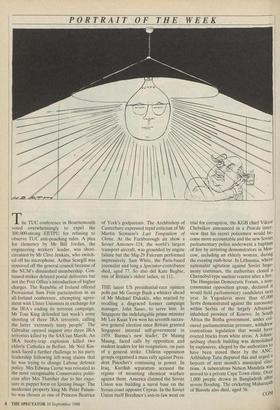PORTRAIT OF THE WEEK
The TUC conference in Bournemouth voted overwhelmingly to expel the 300,000-strong EETPU for refusing to observe TUC anti-poaching rules. A plea for clemency by Mr Bill Jordan, the engineering workers' leader, was short- circuited by Mr Clive Jenkins, who switch- ed off his microphone. Arthur Scargill was removed off the general council because of the NUM's diminished membership. Con- tinued strikes delayed postal deliveries but not the Post Office's introduction of higher charges. The Republic of Ireland offered Provisional Sinn Fein participation in an all-Ireland conference, attempting agree- ment with Ulster Unionists in exchange for the IRA's ending its terrorist campaign. Mr Tom King defended last week's army shooting of three IRA terrorists, calling the latter 'extremely nasty people'. The Gibraltar opened inquest into three IRA terrorists killed by the SAS last March. An IRA booby-trap explosion killed two elderly Catholics in Belfast. Mr Neil Kin- nock faced a further challenge to his party leadership following left-wing claims that he was trying to change Labour defence policy. Mrs Edwina Currie was revealed as the most recognisable Conservative politi- cian after Mrs Thatcher due to her expo- sure in puppet form on Spitting Image. The modernist property king Mr Peter Palum- bo was chosen as one of Princess Beatrice of York's godparents. The Archbishop of Canterbury expressed tepid criticism of Mr Martin Scorsese's Last Temptation of Christ. At the Farnborough air show a Soviet Antonov-124, the world's largest transport aircraft, was grounded by engine failure but the Mig-29 Fulcrum performed impressively. Sam White, the Paris-based journalist and long a Spectator-contributor died, aged 77. So also did Kate Begbie, one of Britain's oldest ladies, at 111.
THE latest US presidential-race opinion polls put Mr George Bush a whisker ahead of Mr Michael Dukakis, who reacted by recalling a disgraced former campaign manager, John Sasso, to serve him. In Singapore the indefatigable prime minister Mr Lee Kuan Yew won his seventh succes- sive general election since Britain granted Singapore internal self-government in 1959. Burma's new leader, Dr Maung Maung, faced calls by opposition and student leaders for his resignation, on pain of a general strike. Chilean opposition groups organised a mass rally against Presi- dent Pinochet's continuing in power. In Iraq, Kurdish separatists accused the regime of mounting chemical warfare against them. America claimed the Soviet Union was building a naval base on the Syrian coast opposite Cyprus. In the Soviet Union itself Brezhnev's son-in-law went on trial for corruption, the KGB chief Viktor Chebrikov announced in a Pravda inter- view that his secret policemen would be- come more accountable and the new Soviet parliamentary police underwent a baptism of fire by arresting demonstrators in Mos- cow, including an elderly woman, during the evening rush-hour. In Lithuania, where nationalist agitation against Soviet hege- mony continues, the authorities closed a Chernobyl-type nuclear reactor after a fire. The Hungarian Democratic Forum, a non- communist opposition group, declared it would field parliamentary candidates next year. In Yugoslavia more than 65,000 Serbs demonstrated against the autonomy within Serbia of the largely Albanian- inhabited province of Kosovo. In South Africa the Botha government, under col- oured parliamentarian pressure, withdrew contentious legislation that would have evicted blacks from white areas. A Johan- nesburg church building was demolished by explosives, alleged by the authorities to have been stored there by the ANC. Arhbishop Tutu disputed this and urged a boycott of next month's municipal elec- tions. A tuberculous Nelson Mandela was moved to a private Cape Town clinic. Over 1,000 people drown in Bangladesh after severe flooding. The cricketing Maharajah of Baroda also died, aged 58. CGM






















































 Previous page
Previous page